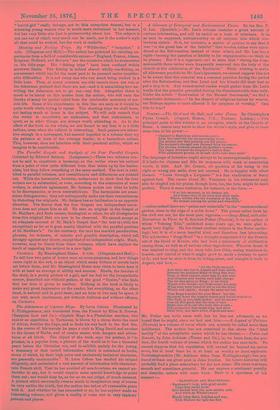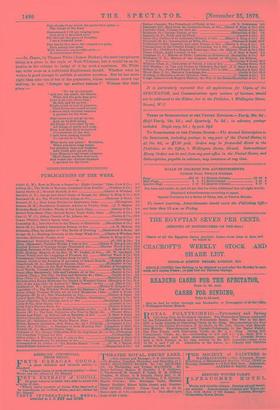POETRY.—The Bird and the Bell, and other Poems. By Christopher
Plaise Cranch. (Osgood, Boston, U.S.; Triibner, London.) — The principal poem in this volume is an energetic attack on the Church of Rome. A stanza may serve to show the writer's style, and give at least some idea of his power:— . Chained to Madonnas and ascetic sainls,
Even Art itself felt thy all-narrowing force.
The painter saw thee peeping o'er his paints;
The sculptor's thought was fettered from its source ; Thy gloomy cloisters shaped the builder's course; Thy organ drowned the shepherd's festive flute With penitential groans, as though God's love were mute."
The language of invective ought always to be unexceptionally vigorous. If it halts for rhymes and fills its measures with weak or unmeaning words, it fails. And Mr. Cranch, all question of his being in the right or wrong put aside, does not succeed. He is happier with other themes. "Luna through a Lorgnette" is a fine vindication of fancy against fact. The verses about Mr. Tennyson in his retirement may also be singled out for praise, though here, too, the form might be more perfect. There is some confusion, for instance, in the lines
If at this moment, in his distant isle And home, shut in by trees and ivied walls, Where, hidden like the fountains of the Nile, He dreams among his palms and waterfalls,"
—unless indeed there are "palms and waterfalls "in the" careless ordered garden, close to the edge of a noble down." The poems called forth by the civil war are, for the most part, vigorous.—.Song-Mead, with other Narratives in Verse, by E. Searlott Potter (Provost), is by an author of whose " Volsung Tale," published some years ago, we were glad to speak very highly. He has found another subject in the Norse mytho- logy, but it is of a more fanciful kind, and therefore less interesting. The mysterious " Song-Mead " is a draught compounded by the Dwarfs out of the blood of Kva9ir, who had been a missionary of civilisation among them, as well as of various other ingredients. Whoever drank it was inspired to sing, and the story tells how Odin, seeing weariness in heaven, and fearful of what it might grow to, made a journey in quest of it; and how he stole it from its hiding-place, and brought it back to Asgard, and how,— "All the Gods rejoiced ; And there was joy In Asgard and high mirth, Because the precious Mead of Song was won: Then, in their council, since that he was wise, And eloquent and worthy such high charge. The jar was given to Brae; to lot drink
Whom Odin would—not Gods alone, but men. When men were found of wit lo use the Mead Wisely and rightly ; though the same are few.
Thus Bragl boarded the pure Mead ; but that Splashed down the Asgard streets and fouled with mire, The Gods, in jest, bade gather; and let shower Over all Mid-gard, that the sons of men
Might take of it—all idle fools that would—
That poetasters thus might sing, and show Their folly, and have scorn of gods and men."
Mr. Potter can write verse well, but he has not advanced, as we hoped that he might, since we last met hina.—A Legend of Poitiers (Provost) is a volume of verse which can scarcely be called more than indifferent. The author has not contrived to rise above the "fatal facility" of the octosyl/abic metre which he has chosen.—Poems and Sonnets, by John Askham (Warne and Co.), is, we learn from the pre- face, the fourth volume of poems which the author has sent forth. We cannot suppose that his reputation will extend far beyond his native town, but of local fame he is at least as worthy as most aspirants. Northamptonshire (Mr. Askham dates from Wellingborough) has pro- duced atleast one great poet in John Dryden. Its future historian will probably find a place somewhere for the now name. His verse is always smooth and sometimes graceful. He can express a sentiment prettily and describe nature with some force. Here is a specimen of his manner :—
"EARTHWARD AND HSAVENWIRD.
Earthward I look, with grief untold, Upon that pallid brow.
Eret flushed with life, now marble cold, And white as Winter's snow.
Hands lying there, helpless and wan, Eyes whence the light has fled,
Pale cheeks from which the smiles have gone ;— The visage of the dead.
Heavenward I lift my longing eyes And grief is banished now.
For through the gates of Paradise
I see a crownhd brow :
Fair hands that wave the conqueror's palm, Eyes gazing into mine, With Heaven's unutterable calm ;— A countenance divine."
—In Poems, by Thomas White (James Parker), the most conspicuous thing is a piece in the style of Walt Whitman, but it would be an in- justice to the volume to judge of it by such a specimen. Mr. White can write verse as a cultivated Englishman should. Whether what he writes is good enough to publish is another question. But he has more right than nine out of ten of the poetasters, whose volumes crowd our shelves, to say, " &Limper ego auditor tantum ?" Witness this little piece :—
To NE QUAESIERIS. "Ask not, my queen, my beauty, What end the gods may give : Love is its own meet duty ; Be still, and let us live.
Bright youth is lord of pleasure, Glad hours are round us now; I weave their choicest treasure A garland for thy brow.
Glad hours and sad go by me, And, as we drift along.
All things of love shall fly me, All things of mirth and song; Even now that dark to-morrow C'ershadows all my way; I turn from coming sorrow To inn me in to-day.
What more, my queen? Hereafter, When you have long forgot Our pleasant days and laughter, And youth and joy are not, Lone Memory's sad sweet pleasure Shall charm as thou dost now, And weave her choicest treasure A garland for thy brow."







































 Previous page
Previous page